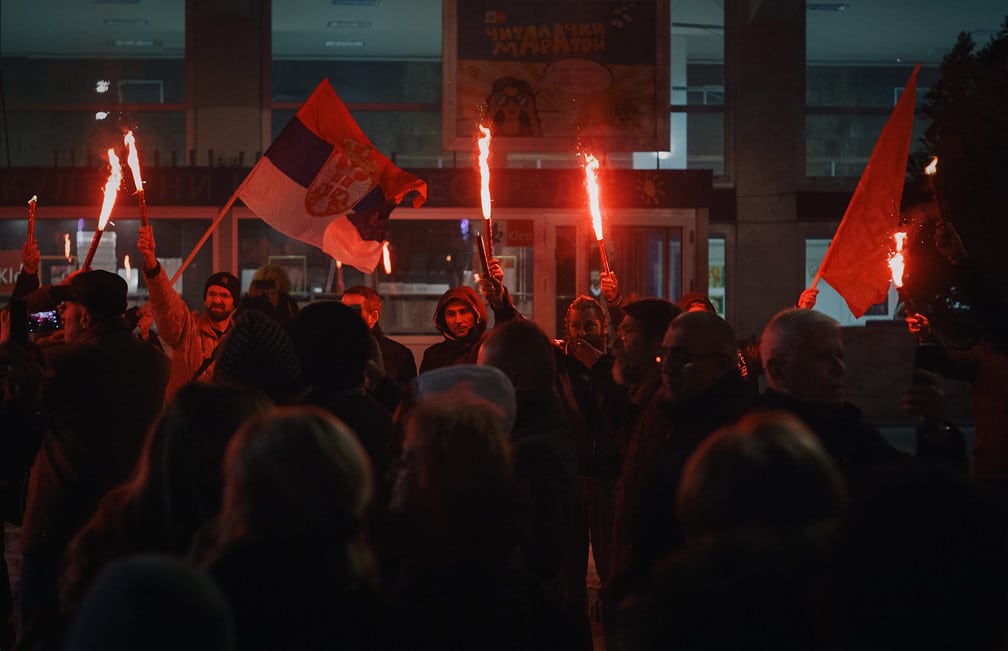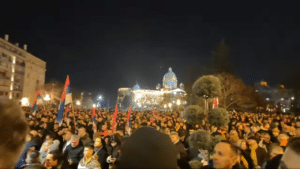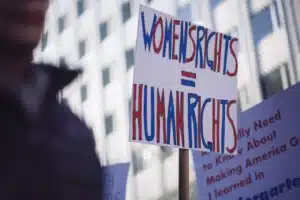Photo: “Stop Bloody Shirts” anti-government protest in 2019 – Flickr
In the evening of September 10, Serbian opposition politician Predrag Voštinić was knocked off his bike by a car in his hometown of Kraljevo, central Serbia. The attack caused injuries to his arm and head as he was kept in the hospital during the night for observation. This incident was no accident, and appears to be a conscious attack on Voštinić – one that follows in a series of attacks on opposition figures. While the freedom of press and the justice system is deteriorating, the safety for members of the opposition to speak out also diminishes. Although Serbia is a EU candidate, recent developments show that much progress is to be made for the country to get back on track with EU accession.
Attempted murder
Voštinić’ colleague from the Local Front party, Vladan Slavković, states that the attackers were filmed and that there were seven people in two cars, among them Police Academy cadets. The Zajedno green opposition party reacted with the following statement: “The one who tried to kill Predrag did it not only to silence him and prevent him from further fighting for Serbia without violence, but demonstrated the intention of the ruling elite to intimidate and hurt anyone who is not a submissive citizen. An organised attack with two vehicles can be nothing more than an attempted murder.”
Vučić’ polarising policies
Opposition in Serbia has been under pressure for a longer time now. President Aleksandar Vučić has been in power since 2017 – previously serving as prime minister. Ruled by Vučić’ SNS party, Serbia has dropped on the democracy-index list, and the freedom of press and expression has come into question. Media are largely controlled by the ruling elite, which amplify anti-opposition sentiment. The government has been accused of corruption, nepotism and the distribution of disinformation. Independent journalists and opposition figures are being censored and physically intimidated, by the likes of Vučić who uses political polarisation to stay in power and secure votes of national-conservative constituencies.
Other incidents
In recent history, journalists have been assassinated. Although, these cases have not been officially confirmed as such. Physical assaults have been recorded regularly. A well-known incident is the attack on prominent opposition figure Borko Stefanović in 2018, who was beaten by a group of seven men. The attack was condemned by the Serbian Left Party as “the result of President Aleksandar Vucic’s ongoing smear campaign against his political enemies, usurping almost the entire media landscape which means that anyone who dares to voice a dissenting opinion is singled out as an enemy.” His blood-soaked shirt became a symbol during subsequent protests. Perpetrators are never identified or caught, let alone sentenced for their deeds. The autocratic Serbian government has created an atmosphere where silencing anyone with a dissenting opinion seems to be an acceptable part of society.
The tactic of creating an unsafe environment for opposition by media campaigns and disinformation can be observed in a wider context. Leading parties in other countries where democratic backsliding took place, such as Hungary or Türkiye, also used these tactics to demonize the opposition. This wider tendency is putting democracy under threat.
In the meanwhile, Serbia is still opting for EU-membership and is receiving funds from the EU for years already, to accommodate the country with achieving accession recommendations. These funds are supporting an autocratic regime with a crumbling freedom of press, justice system and democracy as a whole. EU funds should go hand in hand with EU values, but the reality in Serbia is far detached from these values. A rigorous system of checks and balances is necessary to realistically give Serbia any prospect of future EU membership.
Written by Timon Driessen



